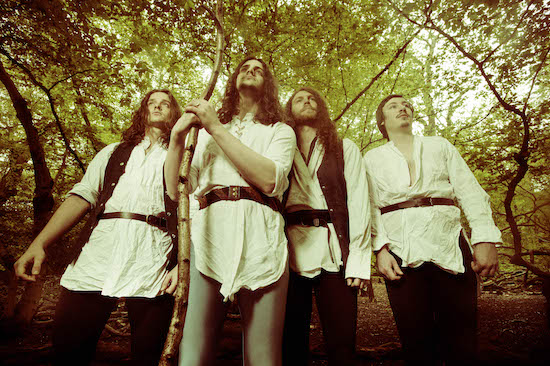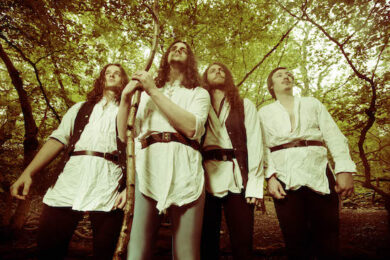Photograph courtesy of Ester Segarra
"The band of choice for the discerning Plantagenet headbanger" is Bad Omen label boss Will Palmer’s perfect description of Wytch Hazel. Given that it combines in equal measure the vigorous gallop of vintage NWOBHM with a bewitching folky veil that draws on the influence of Jethro Tull, Wishbone Ash and sacred medieval vocal music, the band’s debut LP Prelude is a remarkably cohesive record. The impression that the album leaves is one that resides firmly in the Middle Ages: it conjures images of warriors at dawn enjoying the dying embers of the fire in an autumnal forest and the plucking of a lute carrying over the hills; the distant thwack of the knacker’s drum joining a growing cacophony and the last drops of mead drained, the jester risen from slumber before the battle cry goes up.
Wytch Hazel may be a somewhat eccentric proposition (they perform in full ‘battle wear’, rope belts and all), but Prelude is the sound of a deeply assured band, melodically astute, raw and idiosyncratic; hymns of vim propelled by duelling Thin Lizzy-esque licks and a musical aesthetic that reaches back not just decades but centuries, over tumbleweed dyke and wild combe to an age of mythical knives, lusty knaves and sides of beef roasting over roaring fires.
Formed in 2012 by singer and guitarist Colin Hendra, the band released an EP, The Truth, in the same year. Featuring stirring and jaunty tracks such as ‘Throwe Downe Your Sword’ and ‘Fight!’ (a rerecorded version of which is included on Prelude), they quickly gained underground traction due to the quality of the songwriting and strangeness of tone. While the past few years have seen a plethora of fine bands – Satan’s Satyrs, Uncle Acid & The Deadbeats, Asomvel and Admiral Sir Cloudesley Shovell, to name but four – for whom tireless crate-digging and the more esoteric corners of the ’70s underground hold untold delight and inspiration, the sprightly racket espoused by Wytch Hazel is set apart by adhering to a more ancient bearing, a hidden ley line that reaches deep through England’s mystic past.
Can you tell us about the initial genesis of Wytch Hazel?
Colin Hendra: We’re from the Lancaster area. I was at university at the time and our previous guitarist and I were doing a music course in Preston. I saw that he had a Dave Murray [of Iron Maiden] signature strap on his guitar; we became instant friends over that! We went to a lot of heavy metal shows and the initial idea was to do a metal band that had a medieval and folky influence and style.
You studied ancient English music right?
CH: Indeed, I did a lot of study in sacred vocal music and also early Renaissance music. There was an element where early music and sacred vocal music were strongly linked. We focussed on the Renaissance and also the baroque period and tied the two together. I really got into it; there is a real magic to that music, but in terms of how that feeds into the music we do in Wytch Hazel, it manifests itself in our use of the Picardy third, essentially a medieval harmonic technique whereby a major chord is placed at the end of a section that is in a minor key – we use that a lot.
I can really hear that. You have the interplay between the guitars, that ‘duelling’ Thin Lizzy element, too.
CH: We’re influenced by a lot of different techniques. The sacred vocal thing and the SATB score process, which arranges sheet music for the four different vocal types, like a choir. Basically, I started thinking, how could I use those four notes for bass guitar and guitar, rather than voice? How would that work melodically? What would the bassline sound like? How will the chords and melody tie together, and how will we harmonise?
I can hear the NWOBHM influence coming through strongly also. What else do you listen to?
CH: One of the things that makes us not sound like a straight-up metal band is that we don’t just listen to heavy metal! It’s really not the biggest area that I listen to; I’d actually say that hard rock, ’70s stuff, is the biggest overarching influence. Thin Lizzy – I always go back to them – Black Sabbath and Rainbow. I never get bored of that stuff; every time I listen there’s something new. But my wife listens to bucketloads of Fleetwood Mac, so I absorb a lot of that too. All sorts of stuff really: Earth, Wind & Fire, I really like folk music, a lot of the newer underground folk stuff. I guess it all joins together with Jethro Tull though – they’re the constant!
You’re a Christian and a lot of Wytch Hazel lyrics touch on that faith. I wanted to ask whether you’re comfortable with the darker side of metal, thematically. I mean, you’re signed to Bad Omen Records, alongside a band like Satan’s Satyrs, for example, who have very different lyrical themes…
CH: Good question. From my point of view, I see it as, "I’m a Christian in a heavy metal band", I don’t see it as "Wytch Hazel is a Christian heavy metal band". I mean, in our band Neil [Corkery, bassist] is a Roman Catholic and I’m more Protestant and then Josh [Winnard, guitarist] is agnostic/atheist. So, for me, it’s just about doing normal stuff while having a Christian voice or influence. In terms of lyrics and stuff, it was always going to come through because I write the songs, but for me it’s not really an issue – I know that not everyone shares the same views, I believe in democracy.
Metal is a very rebellious genre anyway and Bad Omen is just about good music. Will [Palmer] is into so much of the same stuff I’m into, we share a lot of the same musical tastes and views on music. Ultimately, it’s got to come down to the music. I can see that it might look a bit unusual, and the reality of heavy metal is often quite dark and satanic, but that is just the rebellious nature of metal and that’s what you’ve got to live with.
The underground metal scene is pretty open-minded. I can imagine you guys going down really well at one of the smaller stages at Roadburn, for example.
CH: I’m quite left wing. In terms of belief systems in the Bible, so much has been misquoted or misrepresented by the political right over the years – either that or not read in context – or religion has been used as an excuse to be ignorant, in terms of politics. Most heavy metal is quite rebellious, but in a left-wing way. Personally, for me, the religious side of things goes hand in hand with left-wing politics. Metal is a great place to be because it’s so accepting and, ultimately, about freedom of expression. Hopefully it’s a good place to have a band like Wytch Hazel around!
I want to ask about the recording of Prelude. You have a beautifully warm and raw sound on the record – did this come easily?
CH: It was a largely relaxed experience. We were recording at Foel Studio, which is where Electric Wizard have recorded. The engineer there is incredible. I’ve never seen anyone work like that, in terms of speed and confidence and thinking outside the box; he was just amazing. We didn’t have a huge amount of time either and Ed Turner – the producer – was also fantastic and had a load of great ideas. It was a really easy process, but we talked a lot before we went into the studio about the guitar sound we wanted. Will had advised us to have everything as prepared as possible before we went in – the songs were well-drilled. We wanted that late ’70s guitar sound that was warm and loud; we listened to Wishbone Ash; our pick-ups are late ’60s pick-ups, which is a big part of the sound, these early humbuckers that create this soft sound… it’s also about cranking the amps up really high! It was great fun.
Prelude is out now on Bad Omen Records



